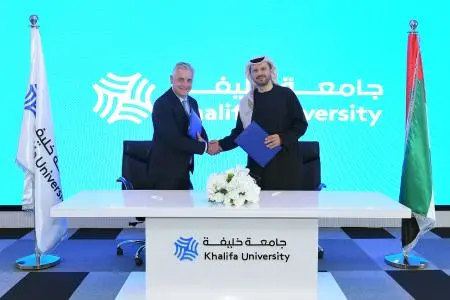PHOTO
Abu Dhabi-UAE: Khalifa University of Science and Technology, a research university dedicated to the advancement of learning through the discovery and application of knowledge, today announced it has signed a memorandum of understanding (MoU) with the Morocco’s National Agency for Energy Efficiency (L’Agence Marocaine pour l’Efficacité Énergétique – AMEE) for research collaboration in energy-efficient technologies.
The agreement was signed by Dr Arif Sultan Al Hammadi, Executive Vice-President, Khalifa University of Science and Technology, and Said Mouline, Chief Executive Officer, AMEE, recently.
Dr Arif Sultan Al Hammadi said: “Khalifa University is renowned for pioneering innovations in energy-efficient technologies covering various renewable energy areas and this MoU will pave way for such innovations to reach communities that require energy. We are delighted to enter into this research collaboration with AMEE and we believe we will be able to offer Morocco the most suitable solutions towards the country’s transition to the clean energy route.”
Saïd Mouline, said: “The collaboration with Khalifa University, a well-known university respecting the environment and promoting energy efficiency, is in line with our strategy of long-term partnerships. With this partnership, AMEE will support a major operator, to enable it to take a step forward in its sustainable approach. The operationalization of energy efficiency is nowadays a privileged tool of good governance and it is essential for reducing the energy consumption and the realization of an increasingly significant green growth rate.”
According to the agreement, the two institutions will jointly promote and facilitate technology exchange and development in several aspects of energy efficiency, and renewable energy covering advanced materials, high performance equipment and expertise. The two have also agreed on fostering joint development and demonstration of clean projects in clean technology innovation.
In addition, AMEE will offer assistance with regard to accessing data on the hourly electricity demand profile of the entire country, while sharing support materials such as technical presentations, studies and successful case studies. On its part, Khalifa University will investigate possible energy transition pathways to complete substitution of fossil fuel energy resources by renewable energy, using the hourly electricity demand profile by regions and by industries.
The collaboration is part of Morocco’s ambitious national energy strategy which targets over 50% of installed electricity production capacity from renewable sources by 2025 and aims to cut energy consumption by 15% by 2030. The country also seeks to reduce greenhouse gas (GHG) emissions by 32% by the year 2030.
Khalifa University’s Research Center for Renewable Energy Mapping and Assessment (ReCREMA) has become a regional research hub for renewable energy mapping and assessment in desert environment in the UAE, Kuwait, Saudi Arabia, Egypt, and Oman. It is playing a pro-active role in bringing International Renewable Energy Agency’s (IRENA) Global Atlas Project to the UAE. The Global atlas servers are presently hosted at the university’s Data Center; operated and maintained by ReCREMA engineers.
ReCREMA was also mandated by the Saudi Government (KA-CARE) to develop the Saudi Solar Atlas and is currently operating the solar forecasting system for Saudi Arabia.
Moreover, Khalifa University currently has several energy efficient technologies-related projects. These include a project to develop a new blend of refrigerants meant to have little or no global warming potential (GWP), to replace widely used refrigerants like hydrofluorocarbons (HFCs).
Khalifa University recently joined the official launch of the Emirates Nuclear Technology Center (ENTC) at its campus. A collaboration with partners including the Emirates Nuclear Energy Corporation (ENEC), and the Federal Authority of Nuclear Regulation (FANR), ENTC aims to support the long-term sustainability of the UAE’s Peaceful Nuclear Energy Program by creating a dedicated innovation hub for peaceful nuclear technologies.
Ends
About Khalifa University of Science and Technology
The Khalifa University of Science and Technology merges the Masdar Institute of Science and Technology, Khalifa University of Science, Technology and Research and the Petroleum Institute into one world-class, research-intensive institution, producing world leaders and critical thinkers in applied science and engineering. The Khalifa University of Science and Technology endeavors to be a catalyst to the growth of Abu Dhabi and the UAE’s rapidly developing knowledge economy as an education destination of choice and a global leader among research intensive universities.
For more information, please visit: http://www.ku.ac.ae/
© Press Release 2020Disclaimer: The contents of this press release was provided from an external third party provider. This website is not responsible for, and does not control, such external content. This content is provided on an “as is” and “as available” basis and has not been edited in any way. Neither this website nor our affiliates guarantee the accuracy of or endorse the views or opinions expressed in this press release.
The press release is provided for informational purposes only. The content does not provide tax, legal or investment advice or opinion regarding the suitability, value or profitability of any particular security, portfolio or investment strategy. Neither this website nor our affiliates shall be liable for any errors or inaccuracies in the content, or for any actions taken by you in reliance thereon. You expressly agree that your use of the information within this article is at your sole risk.
To the fullest extent permitted by applicable law, this website, its parent company, its subsidiaries, its affiliates and the respective shareholders, directors, officers, employees, agents, advertisers, content providers and licensors will not be liable (jointly or severally) to you for any direct, indirect, consequential, special, incidental, punitive or exemplary damages, including without limitation, lost profits, lost savings and lost revenues, whether in negligence, tort, contract or any other theory of liability, even if the parties have been advised of the possibility or could have foreseen any such damages.




















